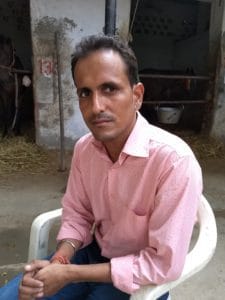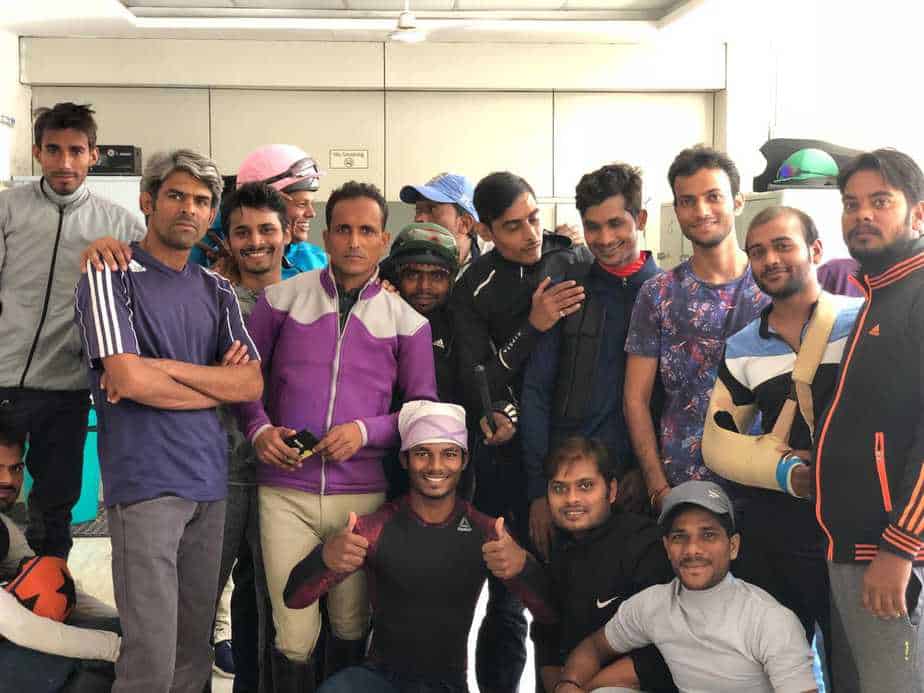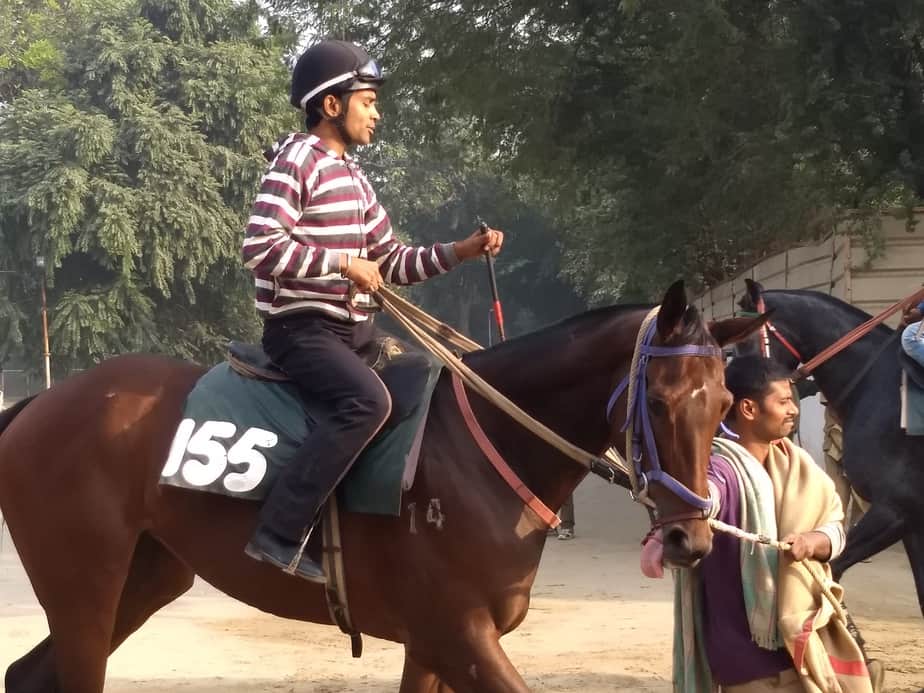Away from the betting and the undeniable excitement associated with horse-racing, jockeys live a comparatively quieter and more peaceful life.
Standing on the edge of the race track, one cannot help but get caught up in a whirlwind of dust and dirt as the horses speed past the fences. The Delhi Race Club is home to around 600 horses and boasts close to 50 jockeys. They race at least two or three times a week, and practise every morning without fail.
“Pehle ghode ka naam toh sabko yaad rehta hai!” (Everyone remembers the name of their first winning horse) says GS Sikhawat, 32, with a smile. He has been a jockey for the past 14 years and is now the President and Head Jockey at the Delhi Race Club. Sikhawat placed first in the first race he ever competed in and says that he remembers the horse he rode clearly, even so many years later. “The horse’s name was Sunny Choice,” he recalls fondly. Sikhawat comes from a long line of horse riders. His father and grandfather were both jockeys and consequently trainers and he aims to follow their footsteps.

In his 14 years of professional horse riding, he has already won over 500 races. A particular body type is preferred, and he would probably not have been able to take up this profession had he been built differently. “I get excited whenever I lay eyes on the horses. I guess it’s in my blood. I never considered a different occupation.”
Having moved from Rajasthan to Delhi after his father passed away, he had a brief stint in Mumbai where he trained in a riders’ club. Following his training, he joined the Delhi Race Club and has been a jockey ever since. “I’ll probably become a trainer after I turn 57,” he says, adding that he will never want to leave this job.
The compound is large and difficult to navigate, with quarters and stables built close to the offices of the trainers. The streets lead to bylanes and small cottages where the workers and their families live. In addition to his duties as a President, Sikhawat has taken it upon himself to ensure that the elderly in the quarters do not face any difficulties and sees to their bank chores and official matters.
A quick chat with one of the trainers, Magan Singh, revealed that most of the jockeys and trainers are actually in the profession as part of a family tradition. Singh’s uncles too were jockeys in their youth, but he could not become one himself as he was too tall for the job. Jockeys are required to be of slight and agile build and he had grown a few extra inches.
MB Qureshi, 22, a newbie compared to most of the others, is an apprentice at the Club and has been riding for four years now, the first of which was for the completion of his training. Qureshi’s family is originally from Meerut, but he was born and brought up in Delhi. In only three years’ time, Qureshi has managed to bag 31 wins, as he admits modestly. “Bachpan se hi horse riding seekh raha hoon,” (I have been learning horse-riding since I was little) he confides. An uncle of his, and other relatives before him, were all horse riders, and it was the only profession he ever considered. With races every other day, and early morning practice every day of the week, one wonders how the jockeys maintain harmony amongst themselves. How does one train with and compete against the same people for years on end, without the heat of competition getting to you? “Simply because we really have little to no connection with the actual betting of money,” replies Qureshi, “We ride because we love to. We all meet every day and get different horses to ride. Outside of the races, there’s no competition between us.”
Anil Kumar, another jockey at the Club, agrees vehemently. “We’re all like family,” he adds. All the jockeys unanimously agreed that they couldn’t be happier in their jobs. They are treated well and most of them are there by choice. Very few jockeys will say they are victims of circumstances and restricted to this job.
Kumar has been a jockey for 12 years now and reminisces about his fondest memory on horseback. “It was my first win on a horse called What A Sight, and I remember it very clearly. It’s my clearest memory from my career.” Kumar wanted to go abroad and pursue horse riding overseas, but did not get a visa , and had to cancel those plans. He ended up settling at the Delhi Race Club and has become comfortable in his daily routine of practice and helping out at the stables.
On the day of a race, the Delhi Race Club is abuzz with people from all walks of life stationing themselves at strategic points to see the horses. The environment is generally very busy and charged with expectations. People walking around, sans mobile phones, with notebooks and pieces of paper in their hands — chatting with one another and cheering on their bets. The management is ever vigilant, equipped with walkie-talkies and ensuring everything is in order. There are people lining up outside the gates too, to catch a glimpse of the races.
During a race, the horses look nothing short of elegant and are well trained and groomed to boot. The jockeys are equally well trained. The excitement is almost palpable. But for the jockeys, it really is just another day. They do not simply enjoy familiarising themselves with the different horses — sometimes building a trusting relationship with the animal. “After a few years, the horses can tell when someone familiar is putting their feet in the stirrups,” says Sikhawat. Having escaped a near-death experience when he fell off his horse at the finish line – “The horses are very alert, the horses are rarely responsible for any injuries. They make sure to step over the riders if we fall.”
![]()

The jockeys are creatures of habit, most of them products of long held family traditions. It is refreshing to see them enjoying the sport for what it is, without paying heed to the money involved. Such a sport surely deserves a long, healthy life. “Our life revolves around racing and practising. This is what we’ve always known,” they surmise, before returning to the stables.





